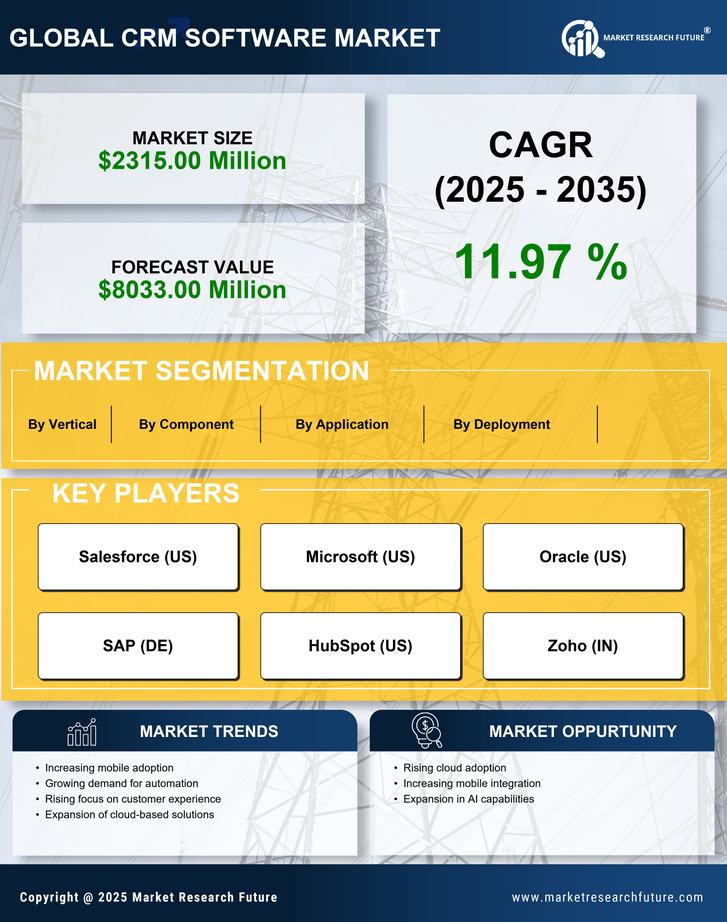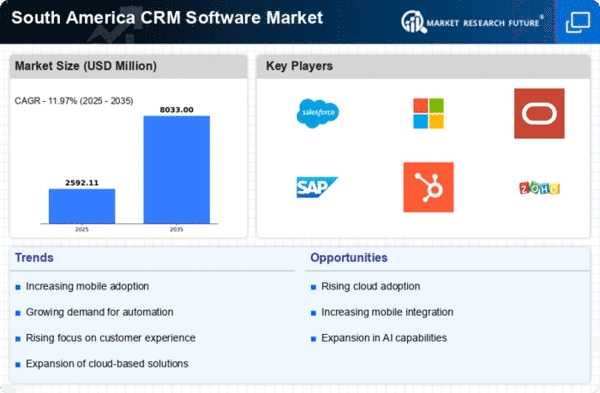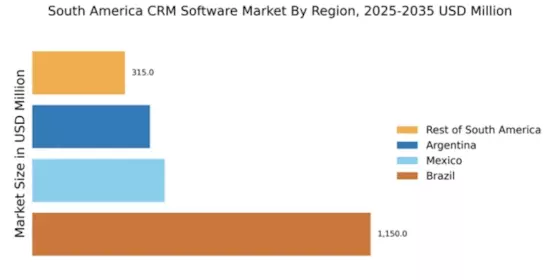The crm software market in South America is characterized by a dynamic competitive landscape, driven by rapid digital transformation and increasing demand for customer-centric solutions. Major players such as Salesforce (US), Microsoft (US), and SAP (DE) are strategically positioned to leverage their technological prowess and extensive resources. Salesforce (US) continues to innovate with its cloud-based solutions, focusing on enhancing user experience and integrating AI capabilities. Meanwhile, Microsoft (US) emphasizes its Azure cloud platform to provide seamless integration with its CRM offerings, thereby enhancing operational efficiency for businesses. SAP (DE) is concentrating on regional expansion, tailoring its solutions to meet local market needs, which appears to strengthen its foothold in the region. Collectively, these strategies contribute to a competitive environment that is increasingly focused on innovation and customer engagement.
Key business tactics within the crm software market include localizing services and optimizing supply chains to better serve regional clients. The market structure is moderately fragmented, with a mix of established players and emerging startups. This fragmentation allows for diverse offerings, yet the influence of key players remains substantial, as they set benchmarks for service quality and technological advancement. The collective strategies of these companies indicate a trend towards collaboration and integration, which may enhance overall market efficiency.
In October 2025, Salesforce (US) announced a partnership with a leading South American telecommunications provider to enhance its CRM capabilities through improved data analytics. This strategic move is likely to bolster Salesforce's market presence by providing localized solutions that cater to the unique needs of South American businesses. The partnership underscores the importance of data-driven decision-making in enhancing customer relationships and operational efficiency.
In September 2025, Microsoft (US) launched a new suite of AI-driven tools within its Dynamics 365 platform, specifically designed for small and medium-sized enterprises in South America. This initiative appears to reflect Microsoft's commitment to democratizing access to advanced CRM functionalities, potentially enabling smaller businesses to compete more effectively. The introduction of these tools may significantly alter the competitive dynamics by lowering barriers to entry for smaller players.
In August 2025, SAP (DE) unveiled a new localized version of its CRM software tailored for the Brazilian market, incorporating features that address specific regulatory and cultural needs. This strategic localization is indicative of SAP's focus on enhancing customer satisfaction and operational relevance in diverse markets. By aligning its offerings with local requirements, SAP may strengthen its competitive edge and foster deeper customer loyalty.
As of November 2025, current trends in the crm software market are heavily influenced by digitalization, sustainability, and the integration of AI technologies. Strategic alliances are increasingly shaping the competitive landscape, as companies seek to enhance their service offerings and operational capabilities. The shift from price-based competition to a focus on innovation and technology is evident, suggesting that future differentiation will hinge on the ability to deliver unique, reliable solutions that meet evolving customer expectations. This evolution may redefine competitive strategies, emphasizing the importance of technological advancement and supply chain reliability.


















